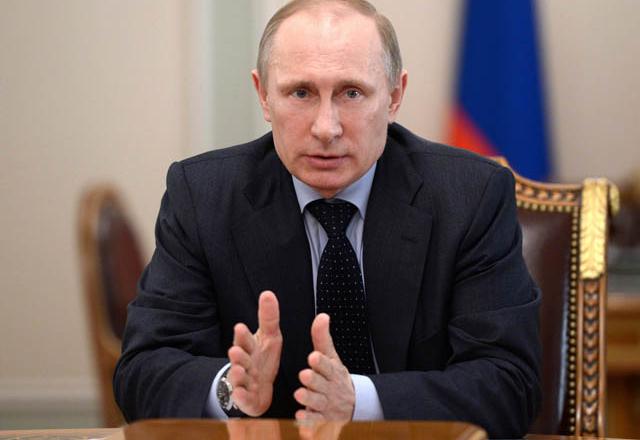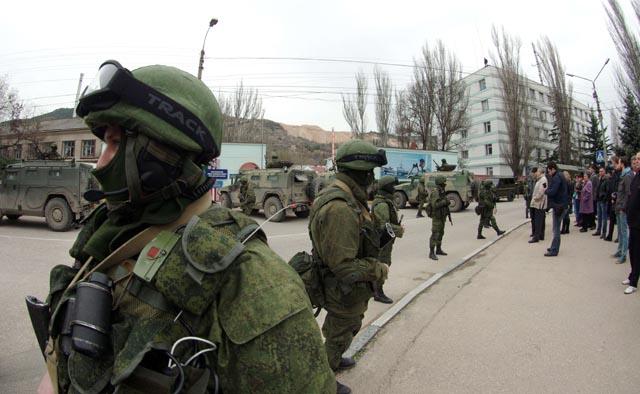You are here
Russia vows no Ukraine invasion as diplomacy intensifies
By AFP - Mar 29,2014 - Last updated at Mar 29,2014

MOSCOW — Russia on Saturday pledged it would not invade mainland Ukraine following its seizure of Crimea, favouring a federal solution for the ex-Soviet state as diplomacy with the West gathered momentum.
Tensions have run high since Moscow’s lightning takeover of Crimea from Ukraine, with the United States accusing Russia of massing tens of thousands of troops on Ukraine’s eastern border.
But signs of progress have appeared in efforts to temper the worst East-West crisis since the Cold War.
US Secretary of State John Kerry and his Russian counterpart Sergey Lavrov pencilled in an impromptu meeting in Paris on Sunday in a further bid to resolve the stand-off following telephone talks between the Russian and American presidents.
Lavrov suggested Moscow’s main demands in the talks were that Ukraine should become a federation, commit to not joining NATO and restore order to cities after almost half a year of street protests.
Putin also told Obama that the problems surrounding the breakaway Moldovan region of Transdniestr — a Russian-speaking region seen by some as the Kremlin’s next target — should be solved not by force but by talks in the “5+2” format of Moldova, Transdniestr, the OSCE, Russia and Ukraine, with the EU and US as observers.
Ukraine is now at a crossroads after the fall of pro-Kremlin president Viktor Yanukovych in February and the clock is ticking down to May 25 presidential elections which are expected to cement Kiev’s pro-West course.
With boxing champion turned politician Vitali Klitschko bowing out of the race, the overwhelming favourite to win the polls is pro-European confectionary tycoon Petro Poroshenko, although feisty former premier Yulia Tymoshenko is expected to mount an all-out campaign since declaring her candidacy this week.
‘No intention’ to invade
Lavrov said Moscow has no intention of ordering its armed forces to cross over the Ukrainian border and acknowledged the divisions between Moscow and the West on the crisis were narrowing.
“We have absolutely no intention and no interests in crossing the Ukrainian border,” he told Russian state television.
“We [Russia and the West] are getting closer in our positions,” he added, saying recent contacts had shown the outlines of a “possible joint initiative which could be presented to our Ukrainian colleagues,” he added.
Lavrov made clear Russia’s priorities for Ukraine were a federalisation which would allow the interests of everyone in Ukraine — including Russian speakers in the east and south — to be fully represented.
He said Kiev should also commit to being non-aligned — with Ukrainian NATO membership clearly a red line for Moscow.
“There should be no ambiguity here. There is too much ‘not for the time being’ and ‘we don’t intend’ [to join NATO]. Intentions change, but facts on the ground remain,” he said.
He said that the West was now “listening” to Russia’s idea of a federalised Ukraine and a federation [for Ukraine] “is far from being a forbidden word in our talks.”
However a clear solution remained elusive.
“There is no single plan,” RIA Novosti quoted Russia’s Deputy Foreign Minister Sergey Ryabkov as saying. “We have differing views of the situation. Our discussions involve an exchange of ideas, but one cannot say that we have some sort of single approach.”
Lavrov-Kerry meeting
The United States and European Union clearly want Russia to de-escalate tensions by removing the troops said to be surrounding Ukraine’s eastern borders.
Kiev this week estimated there were now 100,000 Russian soldiers positioned around Ukraine — a figure neither confirmed nor denied by Moscow.
Putin and Obama had earlier discussed ways to solve the crisis in Ukraine, both the White House and the Kremlin said in separate statements, although neither side gave precise details on the nature of the plan on the table.
However, in a sign both sides feel there are grounds for discussion, Kerry decided mid-flight on a trip back from Riyadh to head to Paris and meet Lavrov.
Both the state department and Moscow confirmed the meeting would take place.
Russia is also feeling economic pressure, with the United States and European Union having already hit Moscow with sanctions against senior officials and markets worried about measures that could hurt the wider economy.
Moody’s put Russia’s credit rating on review for a possible downgrade on Friday, saying the current crisis “could significantly dampen investor sentiment for several years to come”.
Paving way for Poroshenko
Meanwhile, the race to take on the permanent role of Ukraine president became clearer as Klitschko announced he would not stand in the polls, leaving Poroshenko as the clear favourite in what could still be a tight race.
“We have to nominate a single candidate representing the democratic forces,” Klitschko told a congress of his UDAR [Punch] party.
“This has to be a candidate who enjoys the strongest public support. Today, this candidate in my opinion is Petro Poroshenko.”
This could give a clear run to Poroshenko, the only prominent Ukrainian businessman to back the protests against Yanukovych.
Tymoshenko, who was jailed under Yanukovych, has a lot of ground to make up to catch Poroshenko who leads in opinion polls but analysts see her as a wily campaigner who can make up ground.
Related Articles
Russian President Vladimir Putin won the green light from parliament Saturday to send troops into Ukraine after a bloody three-month uprising that swept new pro-EU leaders to power but sparked unrest in the pro-Kremlin Crimean peninsula.
Ukraine’s foreign minister said Monday that his country was practically in a state of war with Russia, as Moscow further ratcheted up pressure on Kiev, claiming that Russian-leaning eastern regions have plunged into lawlessness.
Pro-Moscow protesters in eastern Ukraine seized arms in one city and declared a separatist republic in another, in moves Kiev described on Monday as part of a Russian-orchestrated plan to justify an invasion to dismember the country.













